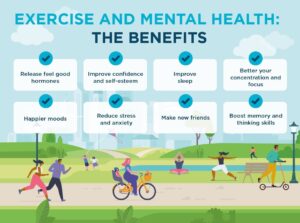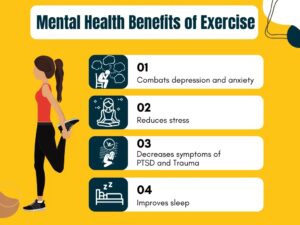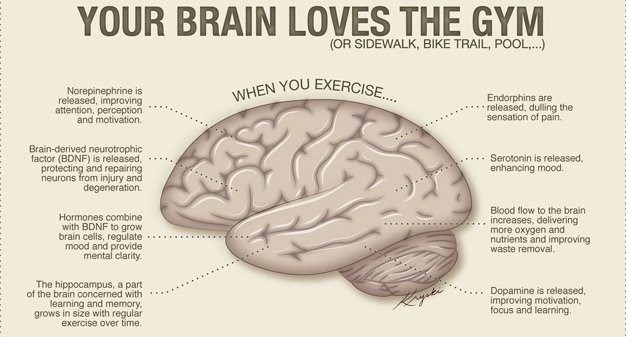In the fast-paced world we live in today, where stress and anxiety have become almost synonymous with daily life, prioritizing mental health is more crucial than ever. While traditional approaches like therapy and medication remain effective, a growing body of evidence points to the powerful impact of regular exercise on mental well-being.
Release of Endorphins:
Endorphins, generally known as the body’s “feel-good” hormones, are released when an individual exercises. These endorphins act as natural painkillers and mood elevators, contributing to euphoria and well-being.

Reduction of Stress and Anxiety:
Regular exercise has been linked to a reduction in stress and anxiety levels. Physical activity helps the body to manage and process stress more effectively by lowering the production of stress hormones like cortisol. Moreover, exercise promotes relaxation, offering a healthy outlet to release tension.
Improvement of Sleep Quality:
Quality sleep is essential for mental health, and exercise plays a pivotal role in regulating sleep patterns. Physical activity promotes a more restful sleep by reducing insomnia symptoms and promoting a deeper, more rejuvenating sleep. A consistent exercise routine can contribute to a more stable sleep-wake cycle, improving overall mental well-being.
Enhancement of Cognitive Function:
This boosts cognitive performance and helps protect the brain against age-related decline.
Social Interaction and Support:
Participating in group exercises or team sports provides an opportunity for social interaction, fostering a sense of community and support. Social connections are vital for mental health, and the camaraderie built through shared physical activities can contribute to a sense of belonging and improved self-esteem.

Boost in Self-Esteem and Confidence:
Regular exercise is associated with improvements in body image, self-esteem, and overall confidence. Whether big or small, achieving fitness goals provides a sense of accomplishment and empowerment. This positive reinforcement can extend beyond physical fitness, positively impacting various aspects of one’s life.
Conclusion:
In the pursuit of optimal mental health, integrating regular exercise into daily life can be a transformative and empowering strategy.
